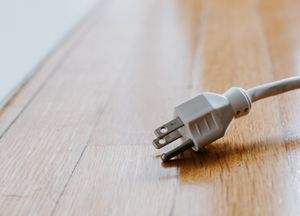By Nick Donaldson
I have been working in a full-time remote role for five years, about half spent as an individual contributor engineer and half spent as a frontline engineering manager. In this time I’ve greatly enjoyed the benefits that come with being a remote employee: flexibility in work location and travel plans, zero commute, and ability to manage the distractions in my work environment.
However, this flexibility comes with a hidden cost – when working from home full-time the boundary between what is “work” and what is “life” can easily become blurred. Shared spaces in our homes serve as both office and personal space. The start and end of the day find us within the same physical location.
Mobile devices can serve as a constant, sometimes unintentional, tether back to the “work” mindset.
This can take a dramatic toll on our well-being. Without a clear boundary between what is “work” and what is “life”, it’s easy for stress and burnout to build up surreptitiously due to the lack of intentional, mindful time spent on things other than work.
At times during my tenure as a remote employee I have found myself suffering from these effects, but never so much as during the summer of 2020, a few months into the COVID-19 pandemic lockdowns. This may come as a surprise – why, as someone who had been used to working full-time remote for years prior, would a mandate to do so make any difference?
For those of us who were affected by stay-at-home orders, not having the option to leave the house at all (at least not in a casual sense) removed some of our autonomy to intentionally disconnect from work. Even though I’d been used to working remotely, my typical routine of working outside the house once or twice a week was no longer an option. I was unable to make plans to meet up with friends or do other things outside the house at the end of the workday. Until that point I had neglected to realize how important a role those things played in defining my work-life boundaries.
Under these circumstances, I found that sometimes staying focused on work was a welcome distraction for my busy and anxious mind when the uncertainty in the world was too much to handle. The COVID-19 situation was, and continues to be, something that was beyond my direct control (or anyone else’s). Therefore, I came to the realization that what defines my work-life boundary needed to shift. If I could no longer casually leave my house, I needed to do a better job defining what my boundaries were from within the house.
One thing I began to notice is that I had been in the habit of compulsively checking Slack and my work email on my phone. From the moment I woke up until long after the end of the typical workday, my phone was there - with new Slack messages to read and new emails to catch up on. As a member of a team spanning four time zones, there really wasn’t much of a “dead” time for new messages until late in the evening.
In order to combat this compulsion and better define my work-life boundaries, I decided to delete Slack and remove my work email from my phone.
Essentially, I set a rule for myself that if I was not sitting at my computer, then I would not be working - I’d be living my life. This enabled me to more effectively define a start and end to my workday and make the most of breaks so that I could return with a clear head. After roughly one week of this practice, I noticed myself having more energy and being more engaged during the workday, and a year later I am still reaping these benefits.
Additionally, at the end of my day, I started to put my work laptop away – out of sight, out of mind.
Work can be very socially engaging in the absence of other social connection, and I was finding that without the ability to check Slack or my email on my phone, I was still tempted to get my laptop back out to see if my coworkers had gotten back to me about “that thing.” Before I knew it, I was getting pulled back into message threads that I should have set aside at the end of my day.
I started this practice with a voice in the back of my head saying, “At some point you’re going to miss something urgent, and it’s going to come back to bite you.” A year later, I’m happy to report that I was dead wrong - not once has missing a Slack message or email outside my working hours caused significant problems for me or my team. That being said, as a mitigation effort, I was sure to socialize my boundaries with my team and make sure they have my phone number for “true” emergencies. Since then, I can count the number of calls or texts I’ve gotten on one hand.
As COVID-19 restrictions start to lift, I now have more of the same options I used to take for granted – to get out of the house and disconnect from my work. However, being intentional about my boundaries for work-related digital communication is a practice I wish I had been exposed to and had implemented much earlier in my tenure as a remote employee.
I would recommend that anyone who is starting or continuing a primarily- or fully-remote job to consider ditching Slack, your work email, or any work-specific apps on your phone, and being very intentional about defining the start and end of your workday.
I am grateful and privileged to work at a company that genuinely cares about redefining work and developing each employee as a whole person. I recognize this approach may not be practical for all roles or in all company cultures. However, if you read this and think, “I could never get away with that at my job,” I implore you to reflect and think critically about why.
Is being “always reachable” an explicitly communicated expectation of your role, or is it something that’s casually permeated its way into your team culture? What would be the consequences of setting explicit communication boundaries and radiating the intent to enforce them for yourself? It might turn out that, as in my case, the pressure you put on yourself is entirely self-imposed.
About the Author
Nick is a software engineer specializing in iOS who lives in Denver, CO and has worked at BetterUp for 5 years. He enjoys making electronic music and art and spending time outside.



Join the conversation